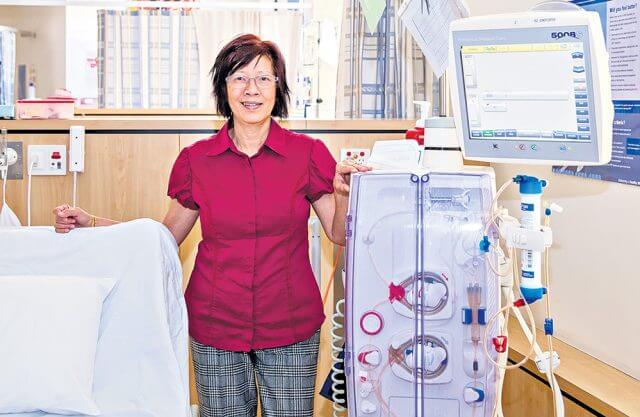
Renal nurse practitioner Casey Light strives to make life better for her patients. Her efforts in research have seen her named a finalist in the WA Nursing and Midwifery Excellence Awards. Robyn Molloy caught up with her about her role.
Years of research by Armadale Health Service nurse Casey Light has made life better for renal patients at the Armadale Kelmscott Memorial Hospital.
A nurse for 35 years, she became the first qualified renal nurse practitioner in WA eight years ago.
Ms Light set up the satellite dialysis unit at Armadale Hospital in 1998, which has evolved to a full renal service with part-time consultant Dr Hemant Kulkarni.
A five-year study into the hepatitis revaccination program has led to changes to protocol and a quicker program for patients.
She carried out pilot studies to seek improvements for haemodialysis patients, who are at greater risk of the disease.
The result will see the length of the revaccination program drop from three years to one.
“Now we are going to change the protocol so instead of giving three yearly boosters we are going to give three monthly boosters,” she said.
“For the dialysis patients they have a very low immunity and they need a higher dose to protect them from getting hepatitis B infection because we are dealing with blood here and hepatitis B is a blood-borne virus.
“They are at higher risk of getting the infection because of the low immunity so it is important we monitor the patients and give them the vaccinations.
“It is a risk for any patient but renal patients are at a higher risk because we are dealing with blood.”
The research into hepatitis B vaccinations is one of two studies that has led to Ms Light being named a finalist for a Nursing and Midwifery Excellence Award in the Excellence in Research category.
Her other research, into iron infusions, has also resulted in changes that will save patients hours in hosptial.
“Traditionally the iron infusion is 200mg of iron given via intravenous infusion over an hour,” she said.
“My research was to reduce it to 15 minutes as an injection into the dialysis lines.
“This is cutting down the time so you can do it while you are having dialysis.”
Ms Light studied the data of more than 1000 injections given to patients over three years.

“I have a data collection tool to educate the staff and make sure they are given over exactly 15 minutes, any that were given more than 15 minutes were not included in my data,” she said.
“Staff checked vital signs before and afterwards and the following day for adverse reactions. They were checked 48 hours later as well so it was quite rigorous.”
Ms Light said iron requirements varied from patient to patient with some needing it every dialysis while others may only need it once a month.
Endorsed by the Department of Health, the new practice protocol is now used at Fremantle Hospital and will soon be adopted by Royal Perth Hospital.
Ms Casey said she was inspired to make life easier for her patients and was reluctant to consider herself a researcher despite having presented her findings to conferences both in Australia and internationally and to journals.
“It is very ground breaking in my renal arena,” she said.
“I am not in the research arena, it is part of my work as a clinician to make the lives of people better.
“That prompted me into looking into better ways of delivering the service to the patients and making it easier for the staff.
“At the end of the study we know this will work and we can straight away change our policy and the way we work.
“It is a win-win for the patients.”
She describes her hours of research as homework as there is not enough time to analyse data whilst seeing patients.
Ms Light acknowledged the effort her nurses put in to the pilot studies.
“They play a crucial role in carrying out the work that I want them to do, I wouldn’t have the data if they didn’t do it properly,” she said.
“The nurses appreciate it because I make their life easier.”
Ms Light is up against Dr Susan Slatyer from Sir Charles Gairdner Hospital and Curtin University and Dr Mandy Towell from Edith Cowan University with winners to be announced in May.













